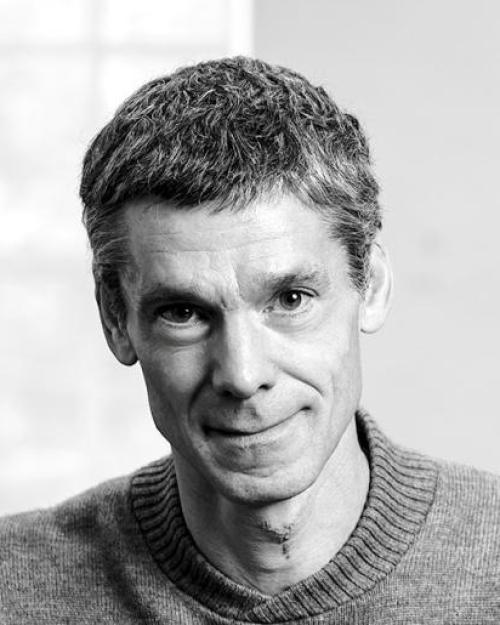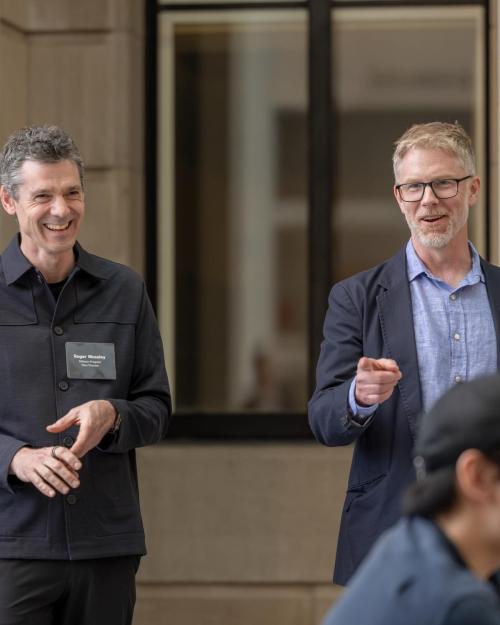Roger Moseley, associate professor of music, has been named the new faculty director of the Milstein Program in Technology & Humanity and will begin in the new role July 1. He takes over from Austin Bunn, associate professor of performing and media arts, who has held the directorship for the past five years.
Milstein students are focused on interdisciplinary thinking and emerging technology and include 25 members of each class in the College of Arts & Sciences. Most Milstein students are accepted into the program during the admissions process, but five spots are left open for students to apply at the end of their first year. The program offers students a community of engaged learners, access to a speaker series and set of core courses, short courses, mentorship, career development and funded research opportunities, including an eight-week immersive experience at Cornell Tech on Roosevelt Island.
"It's been such a privilege to work with Cornell's best and brightest students, who come here specifically for our deep bench of technology expertise and staggering breadth of humanistic research,” Bunn said. “Cornell, like Milstein, thrives at the intersection point of innovation and impact— and there's no better place for this program to be."
During his time as director, Bunn established a first-year project course for students, the M Studio speaker series and the Venture Prize, a $7,500 grant to two graduating Milsteiners to travel, learn and make something new.
“I learned quickly that Milstein Scholars truly want to do and make as part of their education — they see school as a verb,” he said. “The range of their interests (and skills) never ceases to astound me, and I'm there to give them permission to try. I'm most proud of the way we were able to get students off-campus and into the classroom of the real world."
Moseley met many of the current Milstein students during the annual Milstein expo in May, which showcases student projects. He said he’s excited to encourage the students and their multiple interests.

“We’re at a time in history when technological innovations have just become part of the foundation,” he said. “People are seeing that they can serve as springboards for greater creativity, for doing things that weren’t conceivable before.”
Moseley’s current research and creative work crosses boundaries between music, media studies and digital game studies.
“I’m investigating how the concept of play can sharpen our awareness of music’s joys and risks, while addressing the underlying question of how materials, processes, interfaces and media make both music and games conceivable,” he said.
Currently the director of the Cornell Center for Historical Keyboards, Moseley is both a scholar and a performer. He is also editor of Keyboard Perspectives, the journal of the Westfield Center for Historical Keyboard Studies.
One of Moseley’s spring 2025 classes, Thinking Media, included students and guest speakers from across campus who explored the most influential media formats of the last 3,000 years, from hieroglyphs to artificial intelligence. Moseley said he’d love for the class to be a required one for Milstein students.
He and Bunn have talked about other possible Milstein changes, including offering students the chance to phase into or out of the program during their undergraduate careers.
“I would like to broaden the impact of the program and open it to many other students too,” Moseley said.
Bunn said he will miss the close connections made with students.
“Typically, for a professor, your primary relationship with students is through the structure of a class — learning objectives, course requirements, attendance, etc. Milstein is more like an adventure,” he said. “As director, I had the wonderful opportunity to see them stretch, to try, to become themselves.”
The program encourages both theoretical and physical learning, much like music and music performance, Moseley said.
“Music involves both abstract thought and putting concepts into action. It involves your mind and your body,” he said. “The Milstein Program also embraces making as well as thinking, not just acquiring digital skills but implementing them in tangible and consequential ways.”




